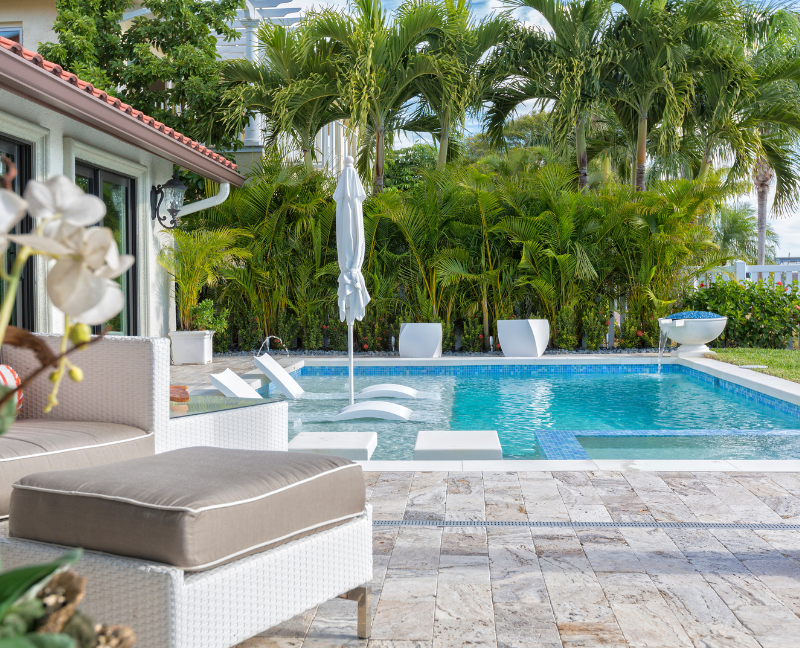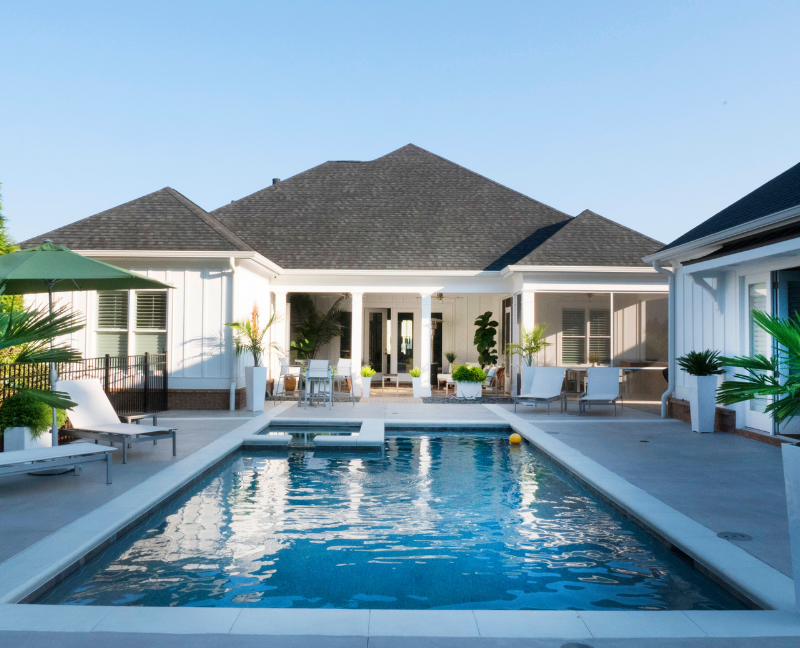Imagine spending a hot day reading a book or sipping a beverage while relaxing by your own swimming pool. Meanwhile, the children, laughing and playing on their pool floats or practicing their dive.
Having a pool at home has long been considered a perk that only elites usually have. However, while others see it as essential, others think it's a deal-breaker.
To find out if installing an in-ground pool is worth it or not, especially if it's the best way to boost home value, make sure to read the entire post.
In the meantime, if you want to know how to boost the value of your home, here are some other free resources:
- Best Home Improvement Tips To Increase The Value Of Your Fix-And-Flip
- 8 Ways To Increase The Market Value Of Your Home
- Here’s Why Adding A Fence Adds Value To Your Home
Is Installing An Indoor Pool The Best Way To Boost Home Value?
In-ground pool owners may anticipate a 56% return on their investment, according to the National Association of REALTORS® Remodeling Impact Report: Outdoor Features for 2023.
When it's time to sell, your home's worth may rise by a maximum of 7%, according to HouseLogic. However, that all relies on several different things, such as:
- Selling your house without a pool may be more difficult if the majority of the homes in your upscale area have swimming pools.
- If you reside in a state with a warm climate: Pools are typical in the Sun Belt and can be a selling point for prospective homeowners. The expectation for your property may be a pool, and the value of your house may suffer if it doesn't have one. However, owning a pool is only a perk rather than a need if you live somewhere where the weather is often chilly and you can only use it for a few months of the year. Customers might stop and think carefully if it's really worth it or not.
- If the pool is beautifully designed and well-maintained: The pool's style and condition have a significant role in its ability to demand a higher price. Your home's worth can increase if you have a well-maintained pool and beautiful surrounding features like patios, shade structures, and outdoor furniture. Making sure the landscaping surrounding the pool matches the pool's style and design might be quite beneficial if you're planning to sell. In contrast, a neglected and in need of maintenance pool can be an eyesore.
- If your house is big enough to have a pool, it won't increase in value if the pool is crammed into a little yard where there isn't enough room for a play area or garden.

The report stated that landscape experts calculated the price of constructing an in-ground pool to be $90,000. A conventional filtration system, three to seven feet of depth, and walls made of gunite (a mixture of sand, water, and cement) are included in the price mentioned. The pool measures eighteen by thirty-six feet.
The cost of installing an inground pool can range from $80 to $250 per square foot, or a total of $25,000 to $100,000, depending on its size and material. Not to mention, tailored renovations or additions will incur additional costs, such as lighting, a diving board or slide, a heater, and landscaping.
Additionally, to keep kids and pets safe around water and to prevent accidents, the majority of jurisdictions mandate the installation of safety elements including covers, enclosures, and fences. For example, the cost of pool fencing alone might range from $5,000 to $15,000.
Sanitation is necessary to keep bacteria and germs under control in your swimming pool, regardless of its style or composition. In order to maintain the right pH, alkalinity, and calcium levels, the water must also be balanced. These are just a few of the annual and monthly expenses that come with owning a swimming pool and can affect its value.
- Pool maintenance: Depending on the services required, experts estimate that this might cost anywhere from $80 to $150 per month on average. Cleaning and vacuuming the surface, testing the water, changing the chemicals, opening or closing for the season, and making any necessary repairs are a few of the responsibilities. Anticipate greater maintenance if you live in a warm region and utilize your pool for the majority of the year.
- Filtration: Although it can cost more upfront, it is recommended to obtain the most energy-efficient filtration pump available. By programming the pump to operate during off-peak hours, when electricity rates are cheaper, you can reduce your energy expenditures even more.
- Costs associated with heating and electricity: If you want to heat your pool, you have two options: gas heaters or electric heat pumps, which range in price from $2,000 to $5,000. Additionally, the annual cost of power for a circulating pool pump is approximately $300. Your utility expenses may increase by $500 to $800 if you heat a pool every year.
- Winterizing: Swimming pools in cold climates require annual winterization. This includes cleaning, clearing the water lines, adding a cover, and reducing the water levels.
A pool structure is usually covered by a normal home insurance policy without the need for a separate rider. However, if you intend to build a pool on your land, think about speaking with your insurance provider about how having a pool can impact your premiums and raise your liability coverage. Furthermore, if you fail to install a pool fence, your insurance may refuse to cover your pool and your liability claim in the event of an accident occurring in your pool.
While installing a pool may raise your yearly property taxes in some places, it may not affect how much your house sells for.
The only person who can accurately assess the return on investment of a luxury purchase like a swimming pool is you, the homeowner. Whether it improves your quality of life by providing a space for leisure, relaxation, and memorable occasions is up to you to determine.
According to the NAR Remodeling Impact Report, homeowners who added a pool reported a "joy score" of 10 on a scale of 1 to 10, suggesting that the addition significantly affected their sense of satisfaction and achievement following the project's completion. Additionally, after adding an in-ground pool, at least 90% of respondents said they enjoy their time at home more. That can be difficult to quantify.
You live here at the end of the day. Go ahead, jump in, and enjoy the swim if you intend to establish roots, have the funds, and have thought through the advantages and disadvantages of building a pool.

